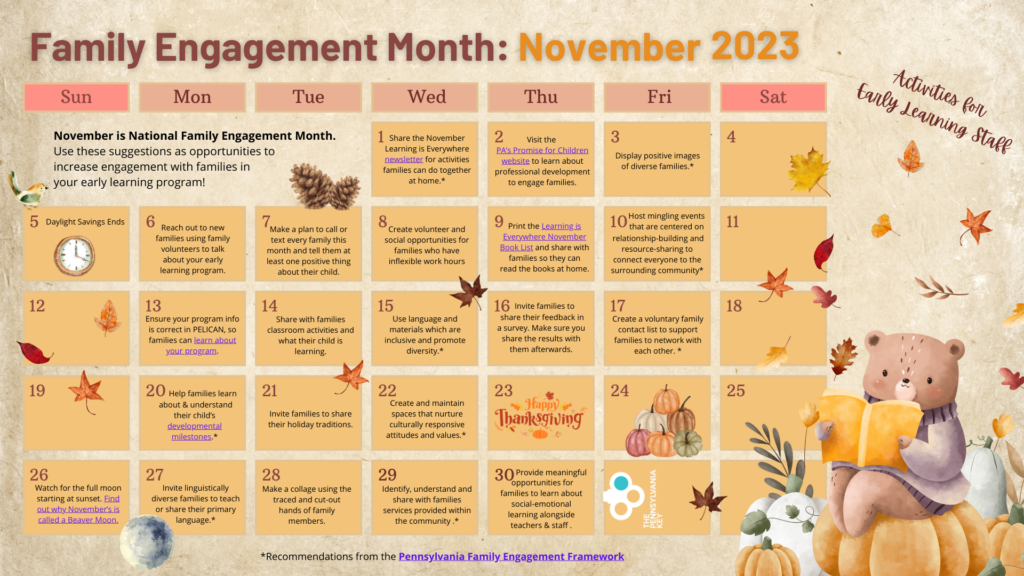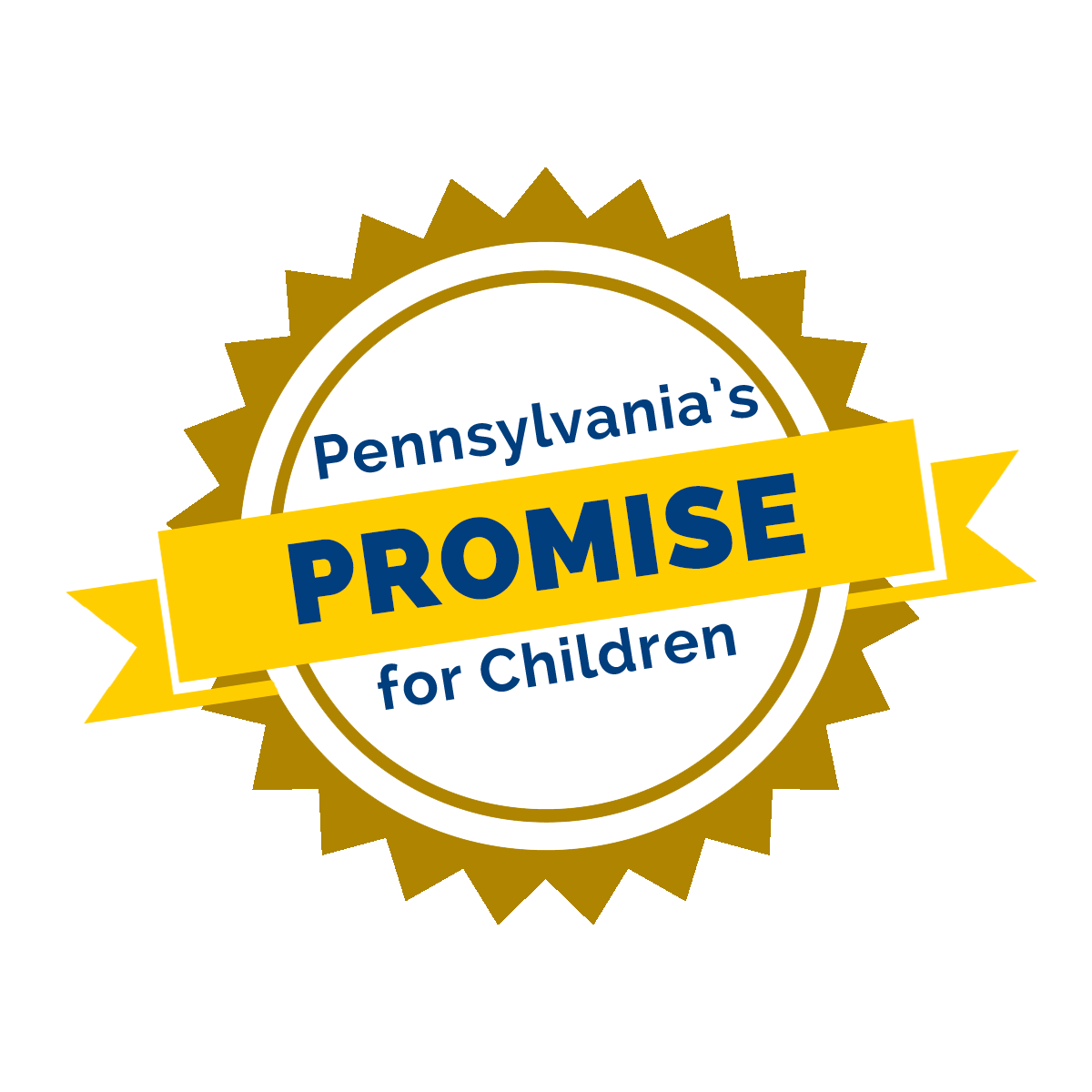Family engagement is a collaborative and strengths-based process through which early childhood professionals, families, and children build positive and goal-oriented relationships. It is a shared responsibility of families and staff at all levels that requires mutual respect for the roles and strengths each has to offer.
(U.S. Department of Health & Human Services, Administration for Children and Families.)

Strong family engagement is central in promoting children’s healthy development and wellness, including:
- social-emotional and behavioral development;
- preparing children for school;
- seamlessly transitioning them to kindergarten; and
- supporting academic achievement in elementary school and beyond.
Read and Listen to Family Stories
Watch the Welcome from OCDEL’s Deputy Secretary, Shante’ A. Brown.
Nikki D.: The Chance to Be a Part of Something Great
Wenxi S.: Making a Positive and Transformative Impact on the System
Heidi A.: Making an Impact in the Crucial Years
Tia T.: Armed with Knowledge Read Tia’s story, Ripple Effect
Mary M.: Gifts and Contributions
Alex L: Being Surrounded by Strong Advocates
See the Family Engagement Leaders Playlist on YouTube.
Would you like to share your story? Send it to Mary at marhal@pakeys.org.
Become Involved
There are many ways families can become involved as a family leader.
The Pennsylvania State Interagency Coordinating Council (SICC) is a Governor appointed council that advises and assists the Departments of Health, Education and Human Services to ensure that a comprehensive delivery system of integrated Early Intervention programs and services is available in Pennsylvania to all eligible infants, toddlers and young children and their families. Learn more.
The Local Interagency Coordinating Councils (LICC) are groups that consist of representatives from families, county administration, Intermediate Units, school districts, Early Intervention providers, Head Start, service coordinators, health agencies, and other community organizations. While each LICC is different, each works toward the overall goal of enhancing local Early Intervention Supports and Services. For additional information, contact Suzanne Pasquariello at spasq@pattankop.net.
P3D brings together families of children receiving Early Intervention or Family Support Services. Family members share their experiences to improve training and resources. P3D promotes connections between families. Learn more.
C2P2 is the school age program that is overseen by IOD and C2P2EI is now housed at OCDEL through EITA and P2P of PA. Connect and Get Involved – Early Intervention Technical Assistance Portal (eita-pa.org)
Parent Cafes are safe and supportive spaces for families with young children to connect, share the joys and challenges of parenting and learn from each other. Learn more.
Family Support Programs
Pennsylvania provides several programs for families with young children in which families can participate and develop their leadership skills. There may be other home visiting programs available in your community. Check with your local Early Learning Resource Center.
Parent Child Home Program is a home-based early literacy program helps families with infants and toddlers. In two half-hour sessions each week over a two-year period, home visitors teach parents how to read and play with their children, promoting positive parent-child interaction, literacy development, and a language-rich home environment. Learn more.
Family Centers help families:
- Learn about their children’s development.
- Engage in parent education and child development activities.
- Access health care information as well as assistance regarding health care services and insurance.
- Access education, training and employment information.
- Receive information and assistance on other community resources, such as well-baby care, immunizations and early intervention services.
Contact your Early Learning Resource Center to find a local family center.
Early Head Start provides early, continuous, intensive, and comprehensive child development and family support services to low-income infants and toddlers and their families, and pregnant women and their families. The program is designed to nurture healthy attachments between parent and child (and child and caregiver), emphasize a strengths-based, relationship-centered approach to services, and encompass the full range of a family’s needs from pregnancy through a child’s third birthday. Learn more.
Healthy Families America is an evidence-based home visiting program model designed to work with overburdened families who are at-risk for adverse childhood experiences, including child maltreatment. Learn more.
Nurse-Family Partnership a nurse home visiting program that helps eligible first-time parents experience healthy pregnancies, learn how to take good care of their babies, and make plans for the future. Home visits by registered nurses promote the physical, cognitive and social-emotional development of the children and provide general support as well as instructive parenting skills to the parents. Services are provided to families prenatally until the child reaches two years of age. Learn more.
Parents as Teachers provides home visits with trained experts who educate parents on how to become the first and most important teacher in their child’s life. It offers support services from pregnancy to kindergarten and serves at-risk families such as teen parents, parents or children with a disability, low-income families, parents without a high school diploma or GED, or those experiencing substance abuse. Learn more.
Parent to Parent of Pennsylvania strives to make sure that no parent feels alone. Ever. We do this by providing families of children with developmental delays, disabilities, or special health care needs, the opportunity to connect with other families. The Parent to Parent of Pennsylvania staff is composed of parents of children and adults with disabilities. Our network of over 1,100 volunteer Peer Supporters are standing by, ready to be connected with a family who would benefit from the emotional support that can only come from someone who truly understands.
For more information, visit Parent to Parent of Pennsylvania – Linking families of children and adults with disabilities or special needs.
For Early Learning Professionals
Use these suggestions in the November Family Engagement Calendar as opportunities to increase engagement and family leadership with families in your early learning program!

Are you an early childhood education professional, looking for professional development to increase family engagement? Check out these professional development opportunities and resources for early childhood education and school-age professionals.
The Pennsylvania PD Registry provides several opportunities for online courses with a focus on family engagement.
To locate Family Engagement Events in the Training Event Search feature of the PD Registry, you can type the name of one of the courses below or the Event ID in the Event ID section. Next, click search for the event to appear. You may register through the PD Registry if the Register tab appears within the event. If there is not a tab to register, please click the overview tab within the event to find directions on how to register within the organization’s website. All completed trainings will show on your Professional Development Learning Record.
Search on the PD Registry for the following courses.
- Antiracism (Part 2): Program Policy and Family Engagement Self-Learning Module – Better Kid Care (Event ID 350884)
- EAT Family Style Module 7: Family Engagement Self-Learning Module – Better Kid Care (Event ID 350926)
- Family Child Care: A Unique Role In Supporting Family Engagement Self-Learning Module – Better Kid Care (Event ID 351065)
- Understanding Poverty: Strategies for Family Engagement Self-Learning Module – Better Kid Care (Event ID 350841)
- Fostering Family Engagement (Event ID 355488)
- Staying Connected–Remote Child and Family Engagement (2-Hour)–Child Care Lounge (Event ID 355698)
- An Introduction to Pennsylvania’s Family Engagement Framework (Event ID 356552)
- Family Engagement (Event ID 357531)
- Family Engagement (Event ID 356753)
- Family Engagement During Times of Stress and Trauma (Event ID 356754)
- Reducing Barriers and Creating Solutions to Improve Family Engagement (Event ID 356948)
- Family Engagement for Children with Disabilities and/or Special Health Care Needs (Event ID 357261)
- Generating IMPACT through Family Engagement, in partnership with Region 9 Head Start Association (Event ID 357150)
- Trauma-Responsive Family Engagement in Early Childhood (Event ID 357075)
Examine how the core beliefs and attitudes of family-centered principles shape the philosophy and practices of Early Intervention programs. Explore Ecological and Family Systems Theories as frameworks for increasing focus on families in Early Intervention. Reflect on the cultural competency developmental process; explore the diverse cultures, values, and beliefs of beneficiary families; and identify strategies to improve professional skills and demonstrate understanding, respect, and empathy in interactions with families. Log in to Early Intervention Technical Assistance to learn more.
Examine how the three primary relationships (parent-child, parent-professional, and professional-professional) in Early Intervention work together to promote and enhance the positive development of children within the context of their families. Reflect on the balance of power between families and professionals and how partnership principles and interaction skills support relationships. Explore strategies to help identify family strengths and resources and identify practices that serve to empower families. Log in to Early Intervention Technical Assistance to learn more.
Learn about the Supporting Families: Charting the LifeCourse Framework and Tools and how they can be useful to teams supporting children transitioning from Early Intervention to the community. Log in to Early Intervention Technical Assistance to learn more.
The Family 5Q refers to five questions parents consider as they structure their interactions with their child to support engagement and learning during routines and activities throughout their day. These questions are part of FGRBI and are used to develop an action plan with families/caregivers for embedding intervention. Log in to Early Intervention Technical Assistance to learn more.
A tool to guide the implementation of effective practices, use of shared language, and a family engagement continuum for families across their child’s educational lifespan. The primary audience for this framework is Pennsylvania’s Learning Communities defined as programs and schools to which Pennsylvania Department of Education (PDE), including the Office of Child Development and Early Learning (OCDEL), a dual deputate of both PDE and Department of Human Services (DHS), and Office of Elementary and Secondary Education (OESE) provide funding, guidance and monitoring. A companion Guide to the Family Engagement Framework was also developed for families—the parent, grandparent, great-grandparent, foster parent, aunt, uncle, or other invested adult who loves and cares for a young person. These two documents together were developed by PDE to explain the standards for creating strong, equal partnerships for family engagement in children’s development and education to educators and families. Learn more at FCE Framework (pa.gov)
